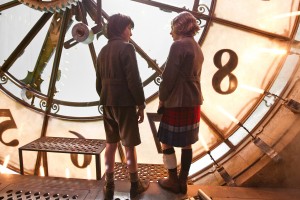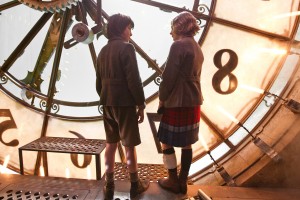‘Hugo’ is one of the most magical movies of all time

This young whippersnapper by the name of Martin Scorsese has created a delightful family film that deserves a tremendous audience and award recognition at the end of the year. You may have heard of this director; he did some work on such film as Goodfellas, Casino, Raging Bull, The Departed and The Aviator.
Seriously, how this prolific filmmaker goes from his self-built style of hyper-realized storytelling with flashy editing and cathartic violence to a touching fable about the birth of the filmmaking industry is a feat unto itself. Hugo is a wondrous achievement that relies on the imagination of the viewer. It delivers a magical landscape and never fails to stun with its Dickensian plot and cast of perpetually-enjoyable supporting characters.
In 1930s Paris, Hugo Cabret (Asa Butterfield in an exquisite performance) is down on his luck. His father (Jude Law, in flashbacks) is dead and he’s left all alone in the voluminous hall of the capital city’s train station. Keeping him company are the many clocks around the building that his father and uncle used to keep ticking-ticking-ticking away.
Among all the machinery, Hugo has found a solitary friend. The problem is that he’s not exactly human and never talks back. An automaton, which looks like a child-size robot, was his father’s final challenge. He found the Metropolis-looking contraption in a museum that had no use for its design or structure. So the Cabrets inherited the little man, but all of their tinkering couldn’t bring him to life. They needed a special key in the shape of a heart to complete the transformation and see what secrets the automaton held.
With his father gone and the local constable (Sacha Baron Cohen) constantly on his tail, Hugo needs to live the life of a bandit on the run. He travels from clock to clock in the train station like Quasimodo in The Hunchback of Notre Dame, always just out of sight and two steps ahead of his enemies.
The one person he doesn’t evade is Georges Méliès (Ben Kingsley), a once-great cinematic pioneer who left the industry and wiles away his old age as a toy seller in the train station. For film buffs, Méliès’ name should sound familiar. The man was a true film auteur, creating some of the earliest stories for the silver screen, including the celebrated A Trip to the Moon.
When Méliès catches Hugo trying to steal from his stall, he snatches the child’s journal, which has drawings and designs of the automaton. The pencil sketches bring back a flood of memories for the former film director. Maybe this robot had a previous life? Maybe Méliès knows a thing or two about the secret heart key?
Scorsese, working off a script by John Logan and a book by Brian Selznick, portrays the plot in a visually arresting style. Paris never looked more beautiful or radiant. From the glowing Eiffel Tower to the inner-workings of the train station, this is one of the finest examples of steampunk filmmaking, with a great focus on contraptions, thing-a-majigs and countless clocks. It appears that Scorsese gathers much influence from the works of Charles Dickens and Roald Dahl. I could see influences of modern movies as well, including Edward Scissorhands and The Polar Express.
What sets Hugo apart is that it serves as an homage, but never feels like one. It values its characters and its storyline completely, always letting the scenery melt over the screen and into our hearts. Although it draws inspiration from the canon of cinema, there is nothing quite like Hugo.
Butterfield is a true find. As a young actor, he is able to bring an unbelievably pure range of emotions to the part. Playing an orphan in the vein of Oliver Twist, Butterfield makes him believable and authentic.
Chloe Grace Moretz as his young accomplice, Isabelle, is equally convincing. Kingsley is at the top of his game, as usual. Even the supporting actors, including Emily Mortimer, Richard Griffiths and Frances de la Tour add much color to the 127-minute feature. (I’m not going to quibble too much that all of these actors are British and not French.)
Baron Cohen offers just the right balance of menacing authority and bumbling idiocy; I was waiting for him to twirl his prominent mustache. It’s probably his finest cinematic work.
Logan’s script is fast-paced and appropriate, considering the time period and varied ages of the characters. The scenic design is Oscar-worthy and leaves a lasting impression.
But it’s Scorsese’s direction that is the most memorable. This one came out of left field for the legendary filmmaker. He’s always shown an aptitude for excellence and the storied history of his chosen profession, and now he can add a family fable to his long list of highlights.
By John Soltes / Publisher / John@HollywoodSoapbox.com-
Hugo
-
2011
-
Directed by Martin Scorsese
-
Starring Asa Butterfield, Ben Kingsley, Sacha Baron Cohen, Chloe Grace Moretz, Ray Winstone, Emily Mortimer, Christopher Lee, Richard Griffiths and Frances de la Tour
-
Written by John Logan; based on a book by Brian Selznick
-
Running time: 127 minutes
-
Rated PG for mild thematic material, some action/peril and smoking
-
Rating:





